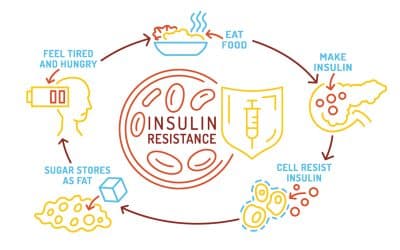Hormone Imbalance
Why You Must Find the Root Causes of Hormone Imbalance
What does it mean when you’ve done everything–you’ve cut out sugar, you exercise, you eat protein, you take supplements, but still you’re having hormonal symptoms? It means the root causes of hormone imbalance are still eluding you!
When Lynn came into my office, she was suffering from weight gain, fatigue, depression, hot flashes, and joint pain. She was forty-three, so of course hormones were a major suspect. Lynn had already been working on her hormones for years. Here is a list of the things she had tried: B vitamins, adrenal support, high-fat diets, keto diets, meditation, cutting out sugar, weight lifting, yoga, adaptogenic herbs, yeast detoxes, liver supplements, probiotics, and carb counting. She had even attended courses on nutrition and had gone to school to become a yoga instructor in search of helping herself.
Doing Everything to Correct Hormone Imbalance
The many steps Lynn had taken to get to the root cause of her hormone imbalance seemed to keep things under control so that she could function, but none of them offered the whole solution. She was rightfully frustrated and more than a little discouraged. Still, she was willing to do whatever it took to have her health and life back.
So what was really going on with Lynn? I ran some blood tests, and something very unexpected showed up. Her iron levels were too high. This is unusual in a woman who is still menstruating. So I had her give blood. Your body is not able to get rid of excess iron effectively, so blood donation is the best way to get rid of it.
After donating blood, Lynn felt different. She felt an immediate change in her energy levels and depression. Her joint pain cleared up 80%. But she just was not able to lose the weight. What else could be going on?
In spite of Lynn’s exemplary diet (she did not eat any sugar, and ate mostly low carbohydrate and Paleo), she still had some blood sugar imbalances. Most other people would not need to take the extra steps that Lynn did to get her blood sugar back into balance, but after she did what was necessary, the weight started to come off, her sleeping improved, and in general all of her problems resolved. Was her blood sugar chronically imbalanced because her iron was too high for too long? I don’t know for certain, but what I do know is that now Lynn is doing great. She is happy to maintain the changes she had to make because she knows that’s what she needs to do to stay healthy.
The Alternative to Finding the Root Cause – Not Pretty
Now let’s look at an alternative possibility. Let’s say that Lynn had gone to a medical doctor to try to resolve her issues. She may have been labeled with chronic fatigue and/or fibromyalgia. Doctors would have given medication for her insomnia. They would have labeled her depressed. She would have had to take brain-altering psych meds just to get through the day. In time, her thyroid would have malfunctioned and she would have needed thyroid medication for life.
No one would have ever found Lynn’s iron overload, because the tests I did are not routinely checked. The iron would have slowly continued to damage her metabolism, leading to insulin resistance and blood sugar problems. These would cause a festering low-grade inflammation, that later in life would lead to heart disease, cancer, or even neurodegenerative diseases such as Alzheimer’s Disease. Lynn would have continued to suffer and feel terrible, even on the medication, as her body continued its slow downward slide.
To Lynn’s credit, she did not let that happen. She was persistent and understood that her problem was nutritional in nature, and that medications would not provide a true fix. She had to get to the root causes of her hormone imbalance. How many people do you know who have settled for pharmaceutical “fixes”, while continuing to suffer with symptoms and poor health?
Are you already suffering like this? Let’s just be honest, too many people are going down that road needlessly.
None of the things that Lynn had done up to the point of seeing me were wrong. Actually, many of them were very right, they just weren’t addressing HER EXACT root causes of hormonal imbalance. Please keep in mind, there are many potential causes of hormone imbalance. Let’s take a look at a few of the root cause issues that were affecting Lynn.
Some Common Root Causes of Hormone Imbalance:
B vitamin deficiency
Although I didn’t specifically mention this above, Lynn had a terrible B vitamin deficiency. B vitamin deficiency is among the top root causes of hormone imbalance. She had been a vegetarian for 20 years, and even though she started eating meat about 10 years prior to seeing me, it just wasn’t enough to make up the deficit. B vitamins are necessary in order to produce energy, think properly, and regulate mood. They are also needed for the body to detoxify properly. If the body is not detoxifying properly, hormones will become imbalanced.
Until her B vitamin deficiency was addressed, Lynn was just not going to get better. Even now, if she forgets to take her B’s, she starts to become fatigued and loses mental focus.
Iron
Most of the time, doctors look at hemoglobin levels to determine if people have low iron. But this this is actually the last place iron deficiency will show up. Low iron will only show up on a complete iron panel, which is almost never routinely ordered. This is also the only place iron overload will show up (unless you want to wait until the high iron levels have damaged your liver and heart, in which case a biopsy of the liver will show if you have too much iron).
As many as 1 out of 3 people have too much iron. 2 out of 10 people have too little. If you do not take care of iron overload, you will have constant inflammation and hormonal imbalance. Too much iron increases your risk of thyroid disease astronomically. Iron deficiencies will also cause thyroid and other hormonal problems. So—might it be VERY important to check if iron levels are correct? In Lynn’s case it was. She suffered with high iron for years before anyone discovered the problem.
Blood Sugar
I would argue that blood sugar problems are the top root causes of hormone imbalance. Symptoms of blood sugar disturbance include: anxiety, depression, weight gain, poor thyroid function, adrenal fatigue symptoms, tiredness, joint pains, brain fog, and chronic colds and coughs. If your blood sugar is too high, your liver and your pancreas have to work extra hard to keep it in check. Too much insulin in your body will cause a cascade of other hormones to become imbalanced. Eventually the thyroid and the adrenals will suffer. You will develop estrogen dominance (and low testosterone, if you’re a man). Eventually, you will feel like garbage.
The problem is, even if your diet is very good (like Lynn’s), it may not be good enough to balance your blood sugar. Certain people are very sensitive (or have developed sensitivity due to chronic inflammation and oxidative stress) and need a very strict diet to finally bring the situation under control.
The good news is, at our office we help our patients go step by step, so your diet never becomes more strict than necessary. But if it is necessary, wouldn’t you like to know that too?
No article on the root causes of hormone imbalance would be complete without also addressing the thyroid and adrenals.
In Lynn’s case, these were not the primary issue, but they were involved because these delicate glands were being damaged by the excess iron in her body. Her ovaries also did not escape harm from the iron overload. Here I would like to discuss each of these topics briefly, because in many women these must be treated directly to get to the bottom of the issue.
Stress and Adrenal Fatigue
You may be sick of hearing, “it’s stress”, even though you know it’s true! But being told it’s stress without offering any solutions is the wrong way to go. Yes, stress will make everything worse, and will cause wicked hormone imbalances. But the problem is, what do you do about stress?
Being in a constant state of “fight or flight” from internal or external (“situational”) stress is not sustainable, if you want to be healthy. The single most effective treatment for stress is to fix the diet. If you’re stressed, and you are reacting by eating pizza, soda, twinkies, drinking and smoking, you are simply feeding the inflammatory hormone-wrecking cascade.
It also goes without saying that doing the things you’re supposed to be doing will decrease stress (as well as to stop doing the things that you’re not supposed to be doing). Lynn’s issue was only partly stress. The good news is, when she fixed her root cause issues, she became able to handle the stress in her life so much better. For some people, however, first you must do something about your stress levels. You probably know exactly what you need to do to fix your stress levels. Do you need me to tell you that now’s the time to do it? Well DO IT!
Thyroid Imbalance
And now we get to the current hot topic. Everyone is talking about thyroid. Hashimoto’s, hypothyroid, Grave’s disease, T3, T4, reverse T3, etc., etc. Lynn’s case looked a bit like thyroid. She would at times suffer from states of overwhelm and mental paralysis. (Did you know constipation and back pain are also symptoms of thyroid?) But when we tested Lynn’s thyroid, her numbers came up perfectly normal, even in the stricter functional reference range that I look at. The thing is this – she WOULD have become a thyroid case eventually. Without addressing the iron overload, b vitamin deficiencies, and blood sugar imbalances, these problems would have caused eventual thyroid damage.
So what do you do if your thyroid numbers are already out of range, and you are on medication? Don’t worry, you can still improve a lot. Luckily, if you address the underlying causes (like mineral and vitamin D deficiencies, gut dysbiosis, chronic infections, heavy metal and chemical toxicity, among other things) most thyroids can heal. If they don’t completely heal, and they won’t if your thyroid has already suffered considerable damage, you can still improve your symptoms and your meds will work much better.
Estrogen Dominance
You have probably gathered by now that most hormonal issues overlap–there can be more than one root cause of hormone imbalance. Estrogen dominance is no different. All of the problems I mentioned so far will cause estrogen dominance. In Lynn’s case, she knew she had estrogen dominance, but could never really figure out why. When we fixed the iron and the blood sugar, her symptoms of estrogen dominance disappeared.
In spite of the many intricacies of the human hormonal system in general, there is a short answer to why estrogen dominance occurs. In the presence of inflammation, estrogen will increase, and progesterone is inhibited. Inflammation also causes weight gain, which further increases estrogen, and lowers progesterone. Find what is causing your body to continue to be inflamed, and you will have your answer. Sometimes the causes of the inflammation are obvious, and sometimes not so obvious. At our office, we specialize in finding what may have previously been missed.
I hope I have been able to give you a better idea of what causes hormonal imbalance. Just realize there is a root cause. To get well, you must find it, and do what is necessary to fix it.
Two of the best ways to find the root causes of hormonal imbalance are Functional Medicine and Nutrition Response Testing. In combination, these methods work beautifully. Blood tests provide valuable information of what problems to look for and what to do about it. Nutrition Response Testing helps to fine-tune your program and even find issues that blood tests will miss.
Talk to a Practitioner
Before you take the leap to get started, see if we can help you first! Sign up for a free 15-minute phone consultation and talk with a practitioner to learn if this unique program is right for you.
Read more about Hormone Imbalance
Insulin Resistance Explained: Early Signs, Functional Testing, and Natural Solutions
One of the things we talk about often in our office is a monster of a problem called insulin resistance—and for good reason. It's one of the most common yet overlooked root causes of issues like fatigue, stubborn weight gain, brain fog, hormone imbalances, and more....
Proactive Steps to Improve Your Thyroid Health (Plus 6 Case Studies!)
Table of Contents1. Understanding Your Thyroid2. How Low Thyroid Function Affects the Body3. Reduce Your Exposure to Toxins4. Avoid Foods You Are Sensative To5. Support Your Immune System6. Optimize Your Liver and Gallbladder Function7. Rule Out Scar Interference8....
7 Keys to Restoring Female Hormonal Balance Naturally
Female hormonal symptoms. They’re rampant! At almost every stage of life, women are subject to all kinds of symptoms related to their monthly (or lack of) hormonal fluctuations. Too much estrogen, estrogen dominance, low progesterone, high male hormones, too much...
The Page Diet: The Most Effective Diet For Overall Health
What is the Healthiest Diet? If you have been a patient of ours, you probably know there are many dietary strategies that can work very well to get you healthier and feeling better. The best diets out there minimize or eliminate processed foods and stress regular...
Liver and Gallbladder: Signs, Symptoms, and Treatment
I recently found out one of the most commonly searched pages on our website is "liver and gallbladder flush". Probably because one of the most common core issues with our patients is liver and gallbladder problems (about 30-50% of our patients have a major problem...
Sleep Issues and Chronic Disease
Sleep issues and chronic disease. Is the lack of a good night’s rest the simple answer to your problems? The Consequences of Poor Sleep Did you know there is such thing as World Sleep Day? This important day falls in March to draw attention to the issue of sleep...
Why Can’t I Lose Weight?
Why can’t I lose weight? I hear this question all day long, so I decided to write a pointed answer to this common question. Common knowledge is that is you cut calories, you will eventually lose weight. The thought is that if you burn more calories than you consume,...
Introduction to Thermography
History of Breast Thermography In 1982 the FDA approved breast thermography as an adjunctive diagnostic breast cancer screening procedure. Since the late 1950s, Breast cancer thermography has been the subject of extensive research. For example: more than 800...
Stress: Adrenal Fatigue
Could You Be Suffering From Stress and Adrenal Fatigue? "Stress is an ignorant state. It believes that everything is an emergency." -Natalie Goldberg Do you wake up in the morning feeling tired? Does your boost of energy dwindle as the afternoon approaches; causing...
Natural help for Type 2 Diabetes
Do you, or a loved one either have type 2 diabetes or have what is called Pre-Diabetes, AKA Syndrome X? I have a lot of patients coming in with these two disorders, so before I talked about it, I decided to look into exactly what the American Diabetes Association is...
Talk to a Practitioner
Before you take the leap to get started, see if we can help you first! Sign up for a free 15-minute phone consultation and talk with a practitioner to learn if this unique program is right for you.





